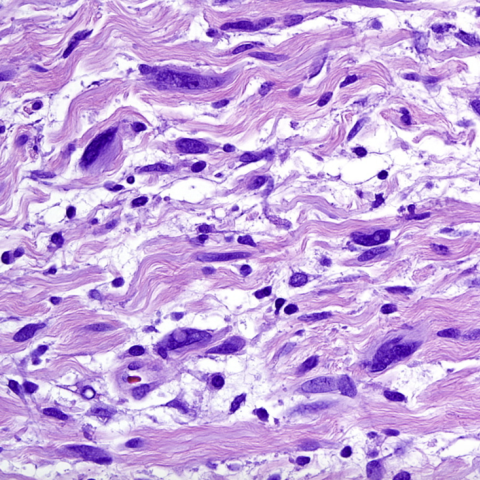
H&E stain of plexiform neurofibroma [CREDIT: Markku M. Miettinen et al.]
A clinical trial evaluating the effects of the drug selumetinib for treatment of inoperable nerve tumors in adults shows that it caused tumor shrinkage in the majority of patients. The results appeared January 6, 2025, in Nature Medicine.
Neurofibromatosis type 1 (NF1) is a genetic condition that causes a type of non-cancerous nerve tumor called plexiform neurofibroma (PN) to form in half of all people with NF1.
“These tumors can become very large, develop from any nerve in the body, and typically present in very young patients, but persist throughout life,” explains Brigitte C. Widemann, M.D., Chief of the Pediatric Oncology Branch. “Many of the tumors cannot be removed by surgery because it would also injure a nerve that is important for function.”
In earlier research, Widemann and her colleague, Andrea M. Gross, M.D., Assistant Research Physician in the Pediatric Oncology Branch, conducted a clinical trial in children with NF1, assessing how the drug selumetinib might help slow or reverse tumor growth and alleviate symptoms such as pain. The drug blocks the RAS/RAF/MEK pathway, which is overactive in tumor cells. The trial had beneficial results, and selumetinib is now approved by the FDA for use in children with inoperable PN.
However, growth of NF1 PN mostly happens during childhood, and it was unclear whether the drug would also benefit adults, in whom PN frequently do not grow but still often cause pain and other symptoms.
Widemann and Gross partnered with Alice Chen, M.D., Head of the NCI Early Clinical Trials Development Program and Developmental Therapeutics Clinic, to conduct a phase 2 clinical trial in 33 adults with inoperable, symptomatic or growing PN. The team’s data analysis occurred when study participants were on the medication for an average of a little over two years.
In total, 64% of participants experienced a partial response to the therapy, meaning their tumors shrank by 20% or more in volume. The effect was sustained in many patients throughout the study.
Along with tumor shrinkage, many patients reported improvements to their symptoms, especially in terms of pain. Overall, the drug was well tolerated, with the most common side effect being a rash.
Importantly, the researchers were able to safely obtain tumor samples before and during treatment with selumetinib, which has not been done in previous studies of NF1 PN.
“Through the analysis of tumor samples, we were able to show that we are hitting the MEK target appropriately,” says Gross. They observed that the drug caused a partial suppression of the MEK signaling pathway, which is responsible for tumor growth, in this study.
These results support an ongoing phase 3 trial testing selumetinib in more adults with PN, which could potentially lead to submission for FDA approval for its use in this population. In the meantime, Gross will be launching an additional trial to see if the drug can be used to proactively prevent the growth of nerve tumors — rather than treat established tumors — in young children with NF1.


